
Why Every Protein Powder Should Include Digestive Enzymes

Your body contains thousands of different enzymes, all with a specific function. Digestive enzymes, for example, are catalysts that help break down food into nutrients the body uses to produce energy. These helpful enzymes are produced in the pancreas, stomach and salivary glands of the human body. Breaking down food into nutrients allows our bodies to generate the energy we need to function in everyday life and to restore and sustain our physical structure. Although our bodies naturally produce digestive enzymes, many people experience poor digestion for a variety of reasons. Supplemental digestive enzymes can be very helpful for people who have digestive issues.
As we age we tend to produce fewer enzymes making digestion less efficient. Others who are physically active, such as athletes or those with physically demanding jobs, they may have difficulty getting enough of the right kind of nutrition, particularly protein. For these reasons and more, scientists and doctors have turned to supplements and food additives that contain helpful digestive enzymes from natural sources. You can now purchase several types of digestive enzymes to put into your food, mix into your drinks and more. Protein powders that include digestives enzymes are becoming popular among the active and non-active alike. There are several reasons every protein powder should include digestive enzymes.
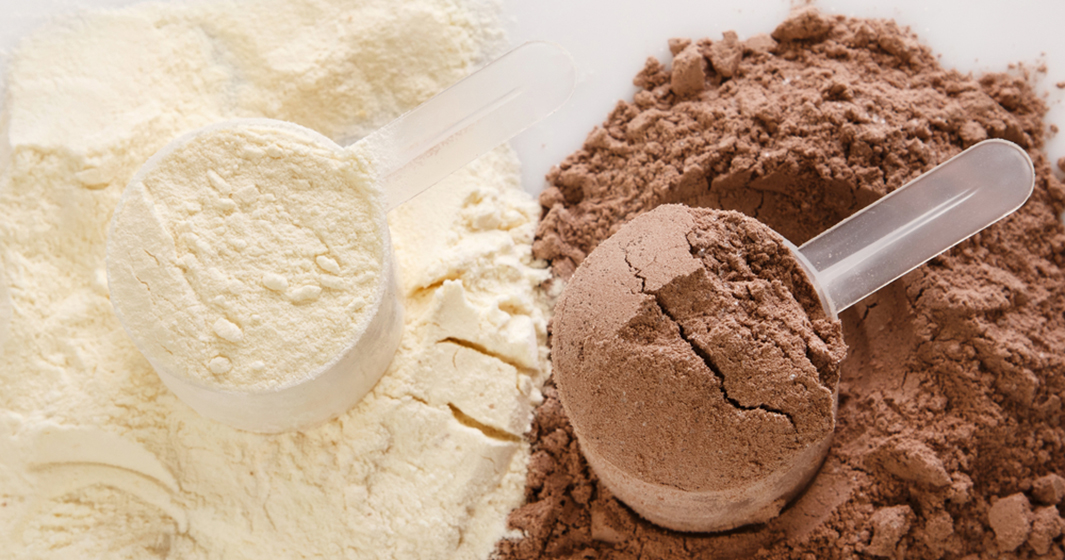
REASONS WHY PROTEIN POWDER SHOULD INCLUDE DIGESTIVE ENZYMES

1. Energy and Strength
The body needs high concentration levels of proper nutrients to produce the energy needed to stay active and function correctly. Your body cannot attain these high concentration levels of nutrients without a well-working digestive system, and digestive enzymes are needed for this. The body also needs certain levels of protein for endurance and strength. If you are extremely active, elderly or malnourished, your body can suffer from a shortage of the proper digestive enzymes and proteins needed to maintain energy and strength. Combining protein powder with digestive enzymes is an incredibly effective way to tackle these intertwined issues. Your body needs energy to push through and grow its strength and, in turn, needs strength to properly use stored up energy. It’s a never-ending loop that constantly feeds into itself. It only makes sense to take something that maximizes this process.
2. Healing and General Health
The role digestive enzymes have in breaking down food into the nutrients our bodies need to function well is incredibly important. Another way of describing this breakdown process is that digestive enzymes “act as catalysts in speeding up specific, life-preserving chemical reactions in the body.” Improving digestive health can help improve gut health which can help improve overall health. In other words, these enzymes keep the body working like a well-oiled machine. Adding protein to the mix is like adding fuel to help run the well-oiled machine. Proteins consist of essential amino acids that help your body recover from injuries and grow strong physically. If you are sickly, vegan or vegetarian, elderly or incredibly active, an extra source of protein in addition to the digestive enzymes is important. In other words, if you want a huge boost in your body’s ability to recover, this combination is perfect for you.
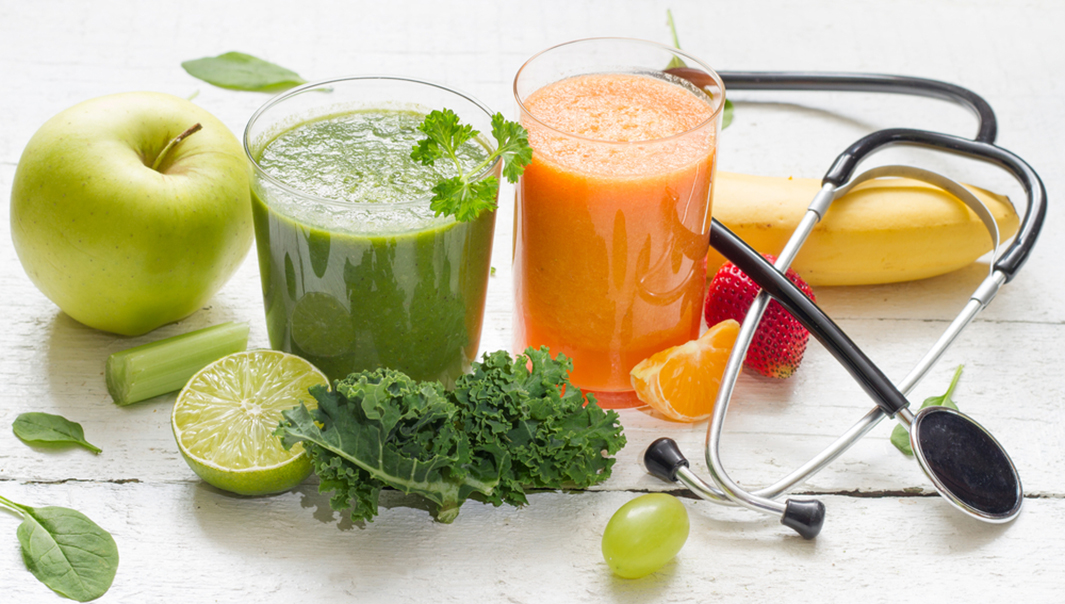
3. More Effective Meal Replacements
Protein powders that have a high concentration of effective digestive enzymes make for better meal replacements. From a nutritional standpoint, if you work out you want a protein powder that contains protease enzymes that quickly and efficiently convert protein into amino acids that can be absorbed into your bloodstream. The more digestive enzymes there are readily available for use during digestion, the less undigested protein there will be going to waste.
4. Enhance Workouts
Protein powders that include digestive enzymes help to quickly enhance muscle growth and strength. Whey protein powders are often the most popular with athletes and bodybuilders who are mainly physique-focused. Protein powders like whey are relatively easy to digest. However, the amount of protein utilized can be limited by the body’s own production of endogenous enzymes. The addition of supplemental protease enzymes can substantially improve the utilization of protein by this group. Other popular protein sources include soy, pea and egg white. For athletes and bodybuilders, there is a critical balance between the workout and maintaining growth of muscle tissue, called anabolism. When there is insufficient protein, breakdown of muscle tissue takes place, called catabolism. So using protease enzymes along with protein powders is essential to keeping the right balance. This is especially important during intense training periods to enhance recovery. Bodybuilders need the fuel and energy that protein powders with digestive enzymes provide to get them through several hours of lifting. They often have a pre-workout shake, a workout shake during the middle of a session and a post-workout shake just to help with energy, stamina and muscle repair.
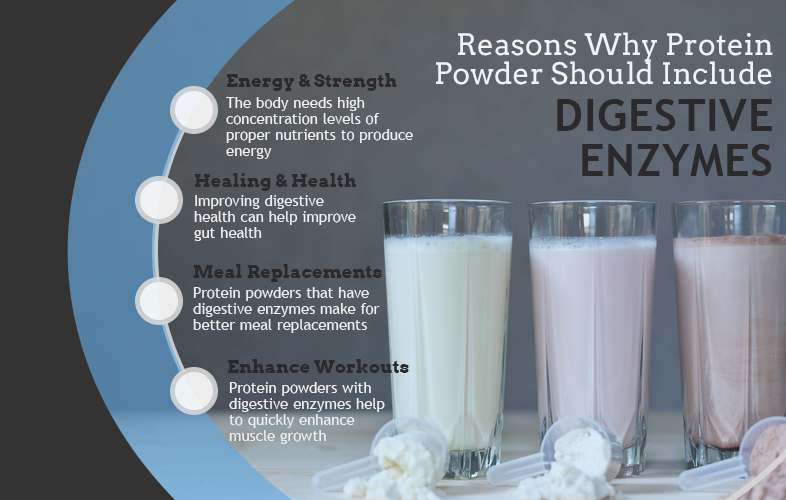
WHAT DIGESTIVE ENZYMES SHOULD YOU LOOK FOR IN YOUR PROTEIN POWDER?
 There are two kinds of powders: meal replacement and protein. They are not the same. Meal replacement powders do exactly what they say: replace a meal. They contain the essential nutrients your body needs for a complete meal while being low in calories, and they have a good balance of all three macronutrients–proteins, fats and carbohydrates. Protein powders provide a high-quality protein to help your body recover after working out, and they contain few carbs and fat. Some contain as much as 30 grams of protein per serving. If you take them with a meal, you may be consuming more protein than your body can digest. There is a certain type of digestive enzyme that complements protein powders, namely proteases. While whey protein is the most commonly used powder, there are also others such as egg white protein, pea protein and soy protein. The added protease enzymes help increase the bioavailability of nutrients from all protein sources. No matter which type of protein you are using, you want to maximize the efficiency in which your body digests the protein and absorbs the available amino acids. There are specific digestive enzymes that help that happen. These are proteolytic enzymes. They include proteases, peptidase, pepsin, trypsin, chymotrypsin, bromelain, and papain.
There are two kinds of powders: meal replacement and protein. They are not the same. Meal replacement powders do exactly what they say: replace a meal. They contain the essential nutrients your body needs for a complete meal while being low in calories, and they have a good balance of all three macronutrients–proteins, fats and carbohydrates. Protein powders provide a high-quality protein to help your body recover after working out, and they contain few carbs and fat. Some contain as much as 30 grams of protein per serving. If you take them with a meal, you may be consuming more protein than your body can digest. There is a certain type of digestive enzyme that complements protein powders, namely proteases. While whey protein is the most commonly used powder, there are also others such as egg white protein, pea protein and soy protein. The added protease enzymes help increase the bioavailability of nutrients from all protein sources. No matter which type of protein you are using, you want to maximize the efficiency in which your body digests the protein and absorbs the available amino acids. There are specific digestive enzymes that help that happen. These are proteolytic enzymes. They include proteases, peptidase, pepsin, trypsin, chymotrypsin, bromelain, and papain.
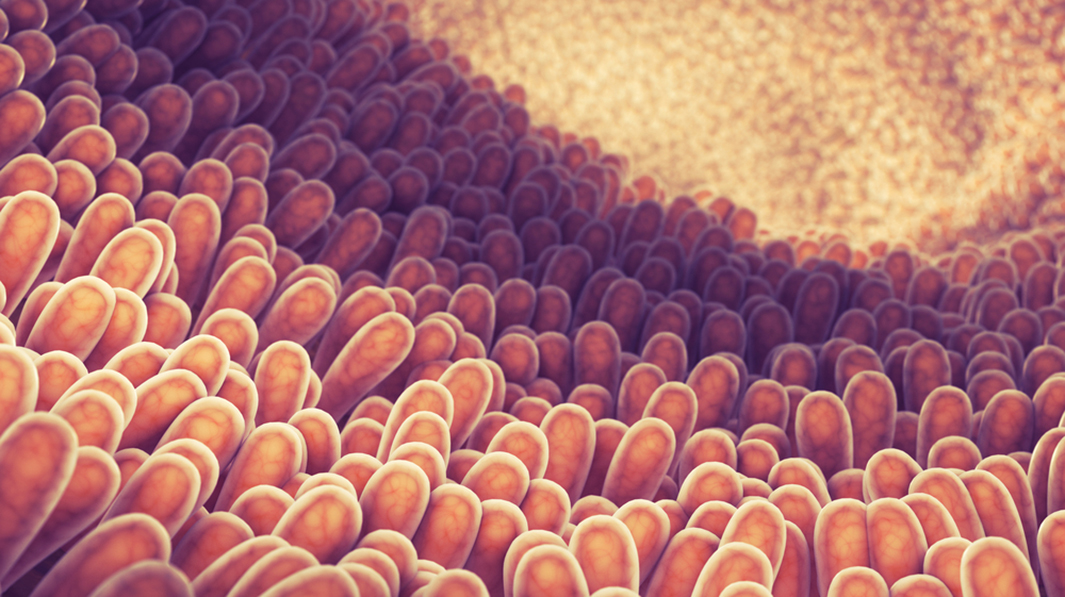 Here is a breakdown of what each of these proteolytic enzymes does.
Here is a breakdown of what each of these proteolytic enzymes does.
- Proteases: This digestive enzyme is one of the most common enzymes used in whey protein powders. It is naturally found in your pancreas, and its main function is to break apart proteins and assist in protein digestion. It is also known for effectively treating pain and inflammation which can often occur after workouts and other such activities.
- Peptidase: This is a type of proteases enzyme that helps digest protein by attacking specific peptide bonds. Like other proteases, peptidase has anti-inflammatory and other healthful properties.
- Pepsin: This protease enzyme is produced in the stomach and is naturally able to function in the acid environment of the stomach. It is essential to be able to function at this low pH to get the digestion of protein started. Otherwise, digestion of protein in the stomach would be very slow.
- Trypsin: Is one of the proteases produced by the pancreas. Collectively, the pancreatic enzymes are called Pancreatin. It includes proteases, amylase and lipase.
- Chymotrypsin: This is another of the proteases produced by the pancreas. Trypsin and chymotrypsin are often purified from pancreatin and used as strong alkaline proteases for a variety of purposes. Both of these proteases exhibit anti-inflammatory properties.
- Bromelain: Bromelain is a protease enzyme that is sourced from the stem of a pineapple. It is known for reducing inflammation, swelling, relaxing and stimulating muscles and helping the body eliminate fat. Protein powders with this protease digestive enzyme will help prevent muscle soreness after workouts and improve joint functions.
- Papain: This powerful protease digestive enzyme is derived from papaya fruit (hence the nickname “the papaya enzyme”). Papain is known for breaking down particularly large, tough protein fibers like those that come from meat. It stimulates digestion, aids in skin and wound healing, helps break down sinus mucus, supports the immune system, acts as an antioxidant and helps prevent redness and irritation.

COMMON MYTHS ABOUT PROTEIN POWDERS
 There are a few myths floating around the health and wellness communities about protein powders that are good to know as you consider whether to invest. 1. Protein powders contain steroids: If you shop from accredited sellers, this will never be a problem you run across. There are plenty of respected brands that go through the proper drug-testing channels for their products, and many brands would not want to risk selling tainted supplies even if they could. 2. Protein powders will make you fat: This is true if you consume too much of anything and do not work out. It is even less likely to happen if you purchase the right types of protein powder with high concentrations of digestive enzymes. 3. Protein powders will ruin your kidneys: There are no conclusive studies that prove this. In fact, most studies have shown just the opposite–especially for healthy individuals with high protein diets. However, if you consume too much protein on a regular basis, your kidneys may be affected due to their workload. Simply cut back on the number of protein shakes you consume, especially around meal times.
There are a few myths floating around the health and wellness communities about protein powders that are good to know as you consider whether to invest. 1. Protein powders contain steroids: If you shop from accredited sellers, this will never be a problem you run across. There are plenty of respected brands that go through the proper drug-testing channels for their products, and many brands would not want to risk selling tainted supplies even if they could. 2. Protein powders will make you fat: This is true if you consume too much of anything and do not work out. It is even less likely to happen if you purchase the right types of protein powder with high concentrations of digestive enzymes. 3. Protein powders will ruin your kidneys: There are no conclusive studies that prove this. In fact, most studies have shown just the opposite–especially for healthy individuals with high protein diets. However, if you consume too much protein on a regular basis, your kidneys may be affected due to their workload. Simply cut back on the number of protein shakes you consume, especially around meal times.
4. Protein powders will increase the risk of bone density problems: This myth has also been debunked by studies that show the opposite to be true. Increasing your protein intake helps with bone density problems, especially in the elderly. 5. Protein powders will increase the risk of a heart attack: Many people believe an increase in protein powders with high digestive enzyme concentrations will cause problems with blood circulation which will eventually create an increase in blood pressure and lead to a heart attack. In this scenario, the opposite once again proves to be true. Studies show that the risk of cardiovascular disease goes down with an increase in protein. 6. Protein powders are less healthy than real food: Although you can receive most of the nutrients you need from real food, most people do not eat all the food essential to fulfill all of their nutritional requirements. Eating is often not the most efficient way to get the right amount of protein and digestive enzymes into your system. Cooking food destroys a lot of the available nutrients, processed foods have very little if any nutrients and most people don’t often supply themselves with a well-balanced diet. Consuming protein powders with digestive enzymes is more efficient and is often a very easy way to ensure your body is getting all the nutrients it needs to function best.
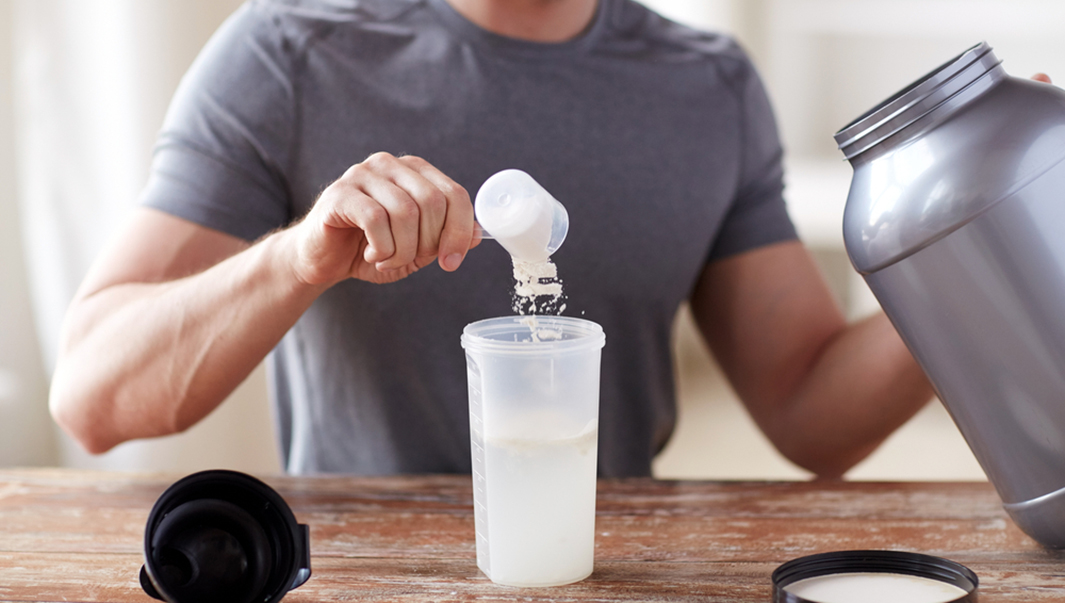
WHEN SHOULD YOU INVEST IN PROTEIN POWDERS WITH DIGESTIVE ENZYMES?
 Most healthy people who are not particularly active or in the process of trying to lose weight or gain muscle should avoid consuming too much extra protein. You never want to spend lots of money on supplements you do not need. This is particularly true if you have a desk job or something similar that requires minimal movement. Even though digestive enzymes can boost your digestive system and there are many added health benefits that come with consuming more of them, using protein powders to do so when you barely move will probably just cause you to gain weight.
Most healthy people who are not particularly active or in the process of trying to lose weight or gain muscle should avoid consuming too much extra protein. You never want to spend lots of money on supplements you do not need. This is particularly true if you have a desk job or something similar that requires minimal movement. Even though digestive enzymes can boost your digestive system and there are many added health benefits that come with consuming more of them, using protein powders to do so when you barely move will probably just cause you to gain weight.
 The best time to invest in protein powders with digestive enzymes is when you are getting ready to do some intense training, when you need a little extra boost to help with post workout recovery or if you plan on losing weight. and gaining muscle. Other candidates are those suffering from digestive conditions like indigestion, bloating, abdominal discomfort and flatulence. Digestive enzymes help break down the difficult-to-digest proteins, fats and starches eliminating stress from the digestive process. Protein powders and meal replacement shakes with digestive enzymes will help you become the better, more fit and healthy person you want to be, in a wholesome way. Specialty Enzymes & Probiotics formulated Pepzyme AG™, a powerful enzyme blend with potent proteolytic enzyme activity to maximize protein digestion, specifically tailor-made to complement any protein powder formula.
The best time to invest in protein powders with digestive enzymes is when you are getting ready to do some intense training, when you need a little extra boost to help with post workout recovery or if you plan on losing weight. and gaining muscle. Other candidates are those suffering from digestive conditions like indigestion, bloating, abdominal discomfort and flatulence. Digestive enzymes help break down the difficult-to-digest proteins, fats and starches eliminating stress from the digestive process. Protein powders and meal replacement shakes with digestive enzymes will help you become the better, more fit and healthy person you want to be, in a wholesome way. Specialty Enzymes & Probiotics formulated Pepzyme AG™, a powerful enzyme blend with potent proteolytic enzyme activity to maximize protein digestion, specifically tailor-made to complement any protein powder formula.




